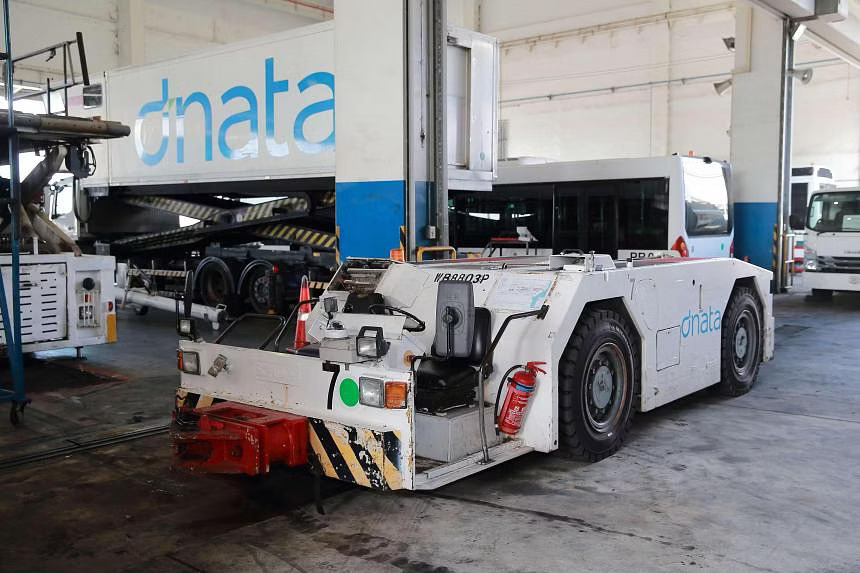Vehicles at Changi Airport to trial use of renewable diesel for a year

(Photo credit: Civil Aviation Authority of Singapore)
Source: The Straits Times
As part of a further move to lower the aviation industry’s carbon footprint, trials on the use of renewable diesel for heavy and specialised airside vehicles will be conducted at Changi Airport.
Airside refers to the area of an airport where loading and unloading of aircraft, as well as take-offs and landings, take place.
The Civil Aviation Authority of Singapore (CAAS) said in a statement on May 13 that the trials – expected to last one year – will be carried out with various parties across the airport community, including airport operator Changi Airport Group (CAG), ground handlers dnata and Sats, as well as aircraft maintenance provider SIA Engineering Company (SIAEC).
Ground handler dnata was the first among these firms to kick-start the trials through a six-month test on 12 of its ground support equipment starting from April 26, with the use of Esso Renewable Diesel R20, made with at least 20 per cent renewable content such as used cooking oil.
The equipment included aircraft pushback tractors and baggage transporters.
Renewable diesel is made from waste materials such as used cooking oil and animal fats.
Sats will be deploying four specialised and heavy vehicles in the tests, while CAG will be trialling seven airside vehicles. The Straits Times has contacted SIAEC on the number of its vehicles that will be involved in the trials.
The total number of vehicles taking part in the trial at Changi Airport is still being determined.
Such trials are eligible for co-funding under the $50 million Aviation Sustainability Programme, which was set up in March 2023 to support sustainable aviation projects with up to 70 per cent funding for sector-wide projects and up to 50 per cent funding for company-level projects, said CAAS. These trials are eligible for up to 70 per cent funding.
CAAS noted that the trials on the use of renewable diesel will help Singapore develop the supply chain and procurement processes for using renewable diesel at Changi Airport, and evaluate its operating performance compared with conventional fossil diesel.
Renewable diesel has up to 95 per cent lower lifecycle carbon emissions compared with conventional fossil diesel, CAAS added. Lifecycle carbon emissions are a measure of the direct and indirect carbon emissions associated with a product, including emissions from raw materials, manufacturing and disposal.
CAAS also said renewable diesel can be adopted as an easy replacement for fossil diesel as it can be used in existing diesel engines without modification.
Minimal adjustments are required for renewable diesel to use existing transportation, storage and distribution infrastructure, it added.
Renewable diesel can also be blended with fossil diesel in any proportion, helping companies to match the use of clean energy to their decarbonisation goals, noted CAAS.
At Changi Airport, there are more than 1,800 heavy and specialised vehicles, as well as ground support equipment, which do not have many viable electric options.
As such, CAAS said one key near-term decarbonisation method is the use of biofuels, particularly renewable diesel.
The sustainable air hub blueprint, launched in February, aims to help Singapore reach 3 per cent to 5 per cent sustainable fuel use by 2030, and net-zero domestic emissions from the island-state’s airports as well as net-zero international emissions from its carriers by 2050.
Other initiatives from the blueprint include a passenger levy on flights departing from Singapore from 2026 to fund the use of sustainable aviation fuel, as well as increased deployment of solar panels at the airport.
CAAS is conducting a second call for proposals under the Aviation Sustainability Programme from May 14 to Sept 30 to support projects that include the adoption of more energy-efficient airport systems, the optimisation of airport processes to improve operational efficiency and sustainability, or the transition to cleaner energy sources.
Mr Han Kok Juan, director-general of CAAS, hopes that this run of renewable diesel trials and the new call for proposals will spur other efforts to decarbonise the aviation sector.
Likewise, Mr Charles Galloway, dnata’s regional chief executive officer for Asia-Pacific, said these trials will help the company optimise its supply chain processes for the use of renewable diesel in its airside equipment, as well as provide valuable insights into renewable diesel consumption patterns.
